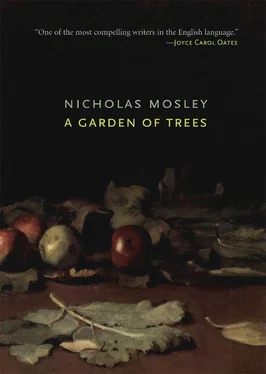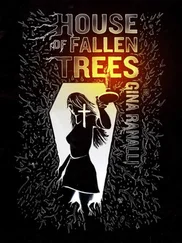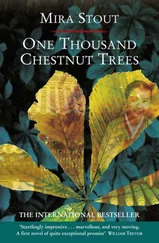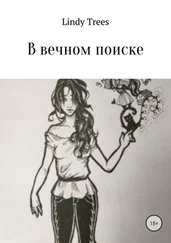“Could you?” he said.
We walked again. It was sad that he was playing the part that I wanted to play and was beating me. I wondered what I should have said to myself, but I knew that he was different. He was, I realized, even sadder than I.
“Besides,” he said, “William was a friend of Annabelle’s.”
I was angry that he was different. “Is it true then that you have to live on incest?” I said.
He stopped. “What?” he said.
“This mumbo-jumbo of incest, this Hamlet rubbish, are you really the savage that should have to be kept from the smell of Annabelle?”
“Damn you,” he said, “don’t you love her?”
“I am not her brother.”
“God damn you to hell,” he said.
We moved on. I remembered how I had been angry once before with Marius. And then I had been happy. But now I did not know what I could say to someone with not even hope.
“Have you then gone over to the side of the old?” he said.
“Hamlet was old. He was twenty-six.”
“I thought he was seventeen.”
“No you see, it is you who are on the wrong side. It is the old who are ditched by their own imaginations.”
“But they do not know it and I do.”
“They are the very old. They are the dead.”
“You don’t know how right you are about Hamlet.”
“Why?”
“You will see,” he said. For the first time he smiled.
Walking and stopping in jerks we reached the palace. A flag licked limply against the sky. I said, “I know that one has got to do something or one goes mad.”
“That does not matter, one has to do the right thing.”
“The choice should not be difficult.”
“It is. Doing the wrong thing sends one mad too, and then it is worse, because then, as you say, one is dead. It is not simply a matter of application.”
“Then choose, choose and try it. You can choose for the whole of your life.”
“I do not believe you can.”
“These are old questions, anyway, why did you ask them now?”
“Because now we are old too, didn’t you say so?”
“I meant that we should be younger,” I said.
We watched a man sweeping up the gravel. He moved precariously like a toy that is running down. “They are the questions that saints ask,” Peter said.
“The questions that saints answer.”
“They ask them first. The most developed form of extrovert is the thug.”
“Is Marius back?” I said.
“Introspection deals with conscience. Conscience is life. Extroversion is the denial of conscience.”
“Or the fulfillment of it.”
“I don’t know whether Marius is back. You have to cultivate your conscience. Yes, after all, I believe Marius is back.”
“And then you have to grow something when your conscience is cultivated. Cultivation is a means and not an end.”
“Yes, yes, but do not deny the means.”
“I am afraid I have not been able to,” I said.
Peter then turned and for the second time he smiled. “And now you must come and see Annabelle,” he said.
“How is she?” I said.
“Old,” he said. He shrugged his shoulders. “Older and older. As old as Hamlet’s mother.” He laughed and walked into the middle of the road and waved for a taxi.
There was something wicked about him. He seemed, in a way, to have suddenly turned into one of those sinister men in foreign cities who take young men round the brothels. It was as if he was eager for ruin like a general haranguing troops before an attack.
As we climbed into the taxi I said, “What has happened?”
“Nothing,” he said. “Nothing ever happens.” We drove up Constitution Hill past the crocuses. The sun was warm. I might have been angry with him, but I preferred him sinister to hopeless. “They want to have me psychoanalysed,” he said. He said this almost with relish.
“Who are ‘they’?” I said.
“My father,” he said.
“That is nothing new either.”
“You will see my father.”
“Fathers always want to have their children psychoanalysed. They like hearing about themselves.” This was a silly remark, I thought.
“They want Annabelle to see a doctor, too,” he said.
“Why?”
He laughed again that desperate laugh of a child at a tragedy. I do not know why I was not afraid. Perhaps anything was more endurable than Annabelle being well and apart from me.
Revisiting a scene that in the past has meant much to you plays tricks with time and is as unnerving as ghosts. Driving to Grosvenor Square through the angry traffic I had the sensation that all the scenes that had been enacted there had happened twice, that I was living in a circle of endless repetitions and it was my folly not to break the circle with the knowledge that my memory gave me. But my memory played me false I felt;—I did not know how many times I had made this journey in the taxi or how often I had met and renounced Annabelle — it was only after the event that the sense of duplicity became apparent. All I knew was that that evening I should feel that I had done something twice, and that at the second time of doing I should have remembered the first.
I thought: Perhaps there is a life as it is intended as well as a life as it happens, and it is only in memory that one can know if they are the same.
The taxi stopped. Flowers, scent, the wealth of carpets. We squeezed into the lift like an upright coffin. I thought: If the scene that is about to happen is already in my memory should I not feel more sad or more excited rather than wishing to escape? The lift carried us.
Peter opened the door. I followed him. There was a small man sitting on top of a step-ladder. “This is my father,” Peter said.
“How do you do,” the man said. “I am sorry I cannot get down. This machine folds up on me like a mousetrap.”
“How do you do,” I said.
“I am trying to remove these curtains. If you would kindly hold on to the ladder I should feel more secure.”
“Yes,” I said.
Peter had gone. Annabelle was not there. If this has ever happened to me before, I thought, I am sure I should remember. I clung to the ladder.
“Spring cleaning is a ritual to which I am addicted. My wife and daughter are not. My wife is three thousand miles away. My daughter is making tea. Will you stay to tea?”
“Thank you,” I said.
“I find that now it is not the custom to invite people to tea. My children are consistently rude. Peter, for instance, has not mentioned tea?”
“No,” I said.
“In my day it was natural to mention tea. It appears that now it is taken as an insult. People imagine that one is accusing them of greed. I fear that soon one will not be able to offer a bed to a visitor without it being taken as an improper remark.”
“Yes,” I said.
“I don’t know how people can think of what to say without manners. I am supposed to be a very rude man, but I am not, I simply can’t think of what to say. Now you, I can see, have good manners. Would you be good enough to hand me the scissors?”
“Yes,” I said.
“Thank you. It is the same with spring cleaning. People despise it now. And soon they will despise eating, and sleeping, and breathing, and then they will die. They simply won’t think it worth while.”
“No,” I said.
“You are a young man of great equanimity. The prospect does not disturb you?”
“No,” I said.
“I find that most remarkable. I, I fear, was upset even by these curtains. My daughter says she never drew them because she liked looking at the night. I myself can never find anything to see in the night. It appears to me to be quite dark.”
I began to laugh. He descended the ladder. He had pale smoky eyes and hair that was brushed with great precision. A small, dapper man with a face like a nut. He folded the curtain and placed it on a chair. “Annabelle,” he called, “your friend is laughing at me.”
Читать дальше












